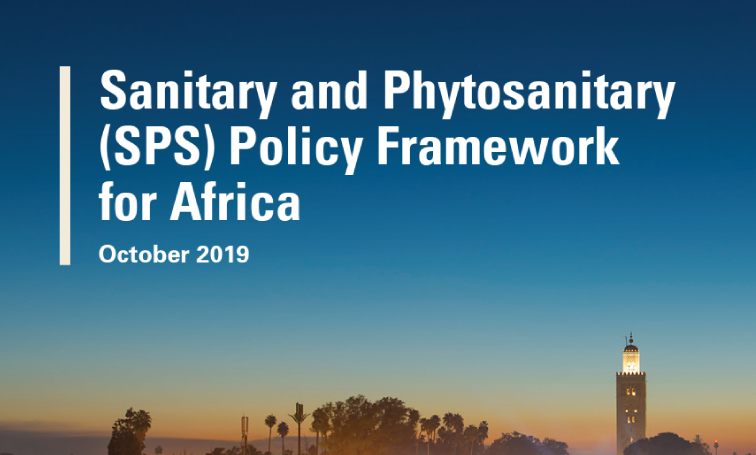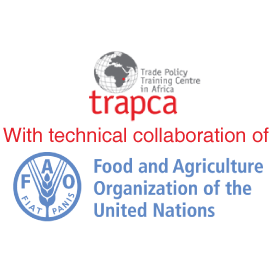
Background On 21 March 2018, the African Union (AU) leaders signed the landmark agreement to establish the African Continental Free Trade Area (AfCFTA), which brings together more than 1.2 billion people with a combined gross domestic product of USD 3.4 trillion, making it the world’s largest free trade agreement.3 The AfCFTA came into force in May 2019 and is now signed by 54 of the 55 countries on the continent. In order to eliminate agricultural and food non-tariff barriers, AfCFTA contains specific provisions for Sanitary and Phytosanitary (SPS) measures in Annex 7 of the Agreement. Annex 7 specifies the provisions necessary to be guided by the World Trade Organization SPS Agreement and based on international standards developed by the Codex Alimentarius Commission (Codex), the International Plant Protection Convention (IPPC), and the World Organization for Animal Health (OIE). The African Union Department of Rural Development and Agriculture (AU DREA), in partnership with Regional Economic Communities (RECs) and their Member States, has an important role to play in strengthening the overall function and integrity of SPS systems on the continent. As the cornerstones of these systems, RECs serve as key sources of SPS guidance and coordination in order to further harmonize standards, and aid in their implementation at the regional level. There are currently eight RECs recognized by the AU: the Arab Maghreb Union (UMA), the Common Market for Eastern and Southern Africa (COMESA), the Community of Sahel-Saharan States (CEN-SAD), the East African Community (EAC), the Economic Community of Central African States (ECCAS), the Economic Community of West African States (ECOWAS), the Intergovernmental Authority on Development (IGAD), and the Southern African Development Community (SADC).4 In consultation with the AU, RECs and Member States have been engaged in assessing public and private sector capacity needs to reach compliance with international SPS standards. Through the leadership of the AU DREA and its Specialized Technical Offices AU-Inter-African Bureau for Animal Resources (AU-IBAR) and the Inter-African Phytosanitary Council (IAPSC), much progress has been achieved in African engagement with and participation in International Standards Setting Bodies (ISSBs), as well as in regional harmonization of SPS standards. In addition, there have been significant harmonization efforts across several RECs, such as the Tripartite Free Trade Area of Africa (TFTA), which aims to promote harmonization of SPS standards across SADC, EAC, and COMESA. However, much work remains to be done to increase capacity for risk assessment on the continent and to adopt equivalence measures that meet international standards. In its pursuit of improved SPS compliance, AU DREA is joined by its Specialized Technical Offices, AU-IBAR and AU-IAPSC, the Department of Trade and Industry, and by SPS leadership from the RECs, ISSBs and international organizations. Together, this expert coalition has developed an AU SPS Policy Framework and accompanying Implementation Plan.
21 March 2018, the African Union (AU) leaders signed the landmark agreement to establish the African Continental Free Trade Area (AfCFTA), which brings together more than 1.2 billion people with a combined gross domestic product of USD 3.4 trillion, making it the world’s largest free trade agreement.3 The AfCFTA came into force in May 2019 and is now signed by 54 of the 55 countries on the continent. In order to eliminate agricultural and food non-tariff barriers, AfCFTA contains specific provisions for Sanitary and Phytosanitary (SPS) measures in Annex 7 of the Agreement. Annex 7 specifies the provisions necessary to be guided by the World Trade Organization SPS Agreement and based on international standards developed by the Codex Alimentarius Commission (Codex), the International Plant Protection Convention (IPPC), and the World Organization for Animal Health (OIE). The African Union Department of Rural Development and Agriculture (AU DREA), in partnership with Regional Economic Communities (RECs) and their Member States, has an important role to play in strengthening the overall function and integrity of SPS systems on the continent. As the cornerstones of these systems, RECs serve as key sources of SPS guidance and coordination in order to further harmonize standards, and aid in their implementation at the regional level. There are currently eight RECs recognized by the AU: the Arab Maghreb Union (UMA), the Common Market for Eastern and Southern Africa (COMESA), the Community of Sahel-Saharan States (CEN-SAD), the East African Community (EAC), the Economic Community of Central African States (ECCAS), the Economic Community of West African States (ECOWAS), the Intergovernmental Authority on Development (IGAD), and the Southern African Development Community (SADC).4 In consultation with the AU, RECs and Member States have been engaged in assessing public and private sector capacity needs to reach compliance with international SPS standards. Through the leadership of the AU DREA and its Specialized Technical Offices AU-Inter-African Bureau for Animal Resources (AU-IBAR) and the Inter-African Phytosanitary Council (IAPSC), much progress has been achieved in African engagement with and participation in International Standards Setting Bodies (ISSBs), as well as in regional harmonization of SPS standards. In addition, there have been significant harmonization efforts across several RECs, such as the Tripartite Free Trade Area of Africa (TFTA), which aims to promote harmonization of SPS standards across SADC, EAC, and COMESA. However, much work remains to be done to increase capacity for risk assessment on the continent and to adopt equivalence measures that meet international standards. In its pursuit of improved SPS compliance, AU DREA is joined by its Specialized Technical Offices, AU-IBAR and AU-IAPSC, the Department of Trade and Industry, and by SPS leadership from the RECs, ISSBs and international organizations. Together, this expert coalition has developed an AU SPS Policy Framework and accompanying Implementation Plan.

